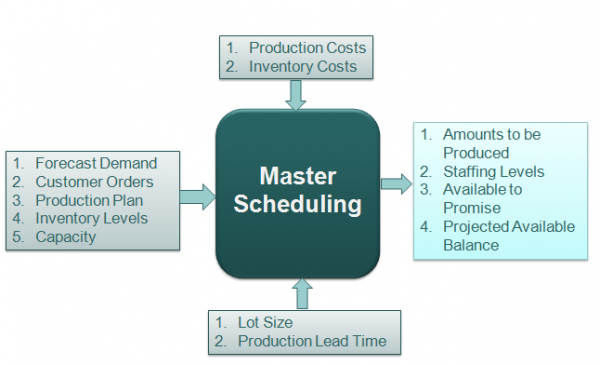Master Production Schedule
 The MPS (Master Production Schedule) define precisely the required quantity per period for each finished product to sell. The bucket is usually the week and the time horizon up to 3-6 months or a least twice the longest product leadtime.
The MPS (Master Production Schedule) define precisely the required quantity per period for each finished product to sell. The bucket is usually the week and the time horizon up to 3-6 months or a least twice the longest product leadtime.
The aggregate MPS at product level should match with the S&OP defined at product family level and the deviation should be under 3-5% maximum.The MPS is the reference for the customer service that needs to satisfy its customers, and also for the manufacturing that should plan accordingly taking into account the constraints.
The APICS dictionary defines the Master Production Schedule as follows:
1) The anticipated build schedule for those items assigned to the master scheduler. The Master Scheduler maintains this schedule, and in turn, it becomes a set of planning numbers that drives Material Requirements Planning. It represents what the company plans to produce expressed in specific configurations, quantities, and Dates. The Master production Schedule is not a sales forecast that represents a statement of demand. The Master Production Schedule must take into account the forecast, the production plan, and other important considerations such as backlog, availability of material, availability of capacity, and management policies and goals. Syn. Master Schedule
2) The result of the master scheduling process. The master schedule is a presentation of demand, forecast, backlog, the MPS, the projected on hand inventory, the available-to-promise quantity.
The MPS is a vital link in the production planning system:
- It forms the link between production planning and what manufacturing will actually build;
- It forms the basis for calculating the capacity and resources needed;
- The MPS drive the MRP. As a schedule of items to be built, the MPS and bills of material determine what components are needed from manufacturing and purchasing;
- It keeps priorities valid. The MPS is a priority plan for manufacturing.
The MPS forms a vital link between sales and production as follows:
- It makes possible valid order promises. The MPS is a plan of what is to be produced and when. As such, it tells sales and manufacturing when goods will be available for delivery;
- It is a contract between marketing and manufacturing